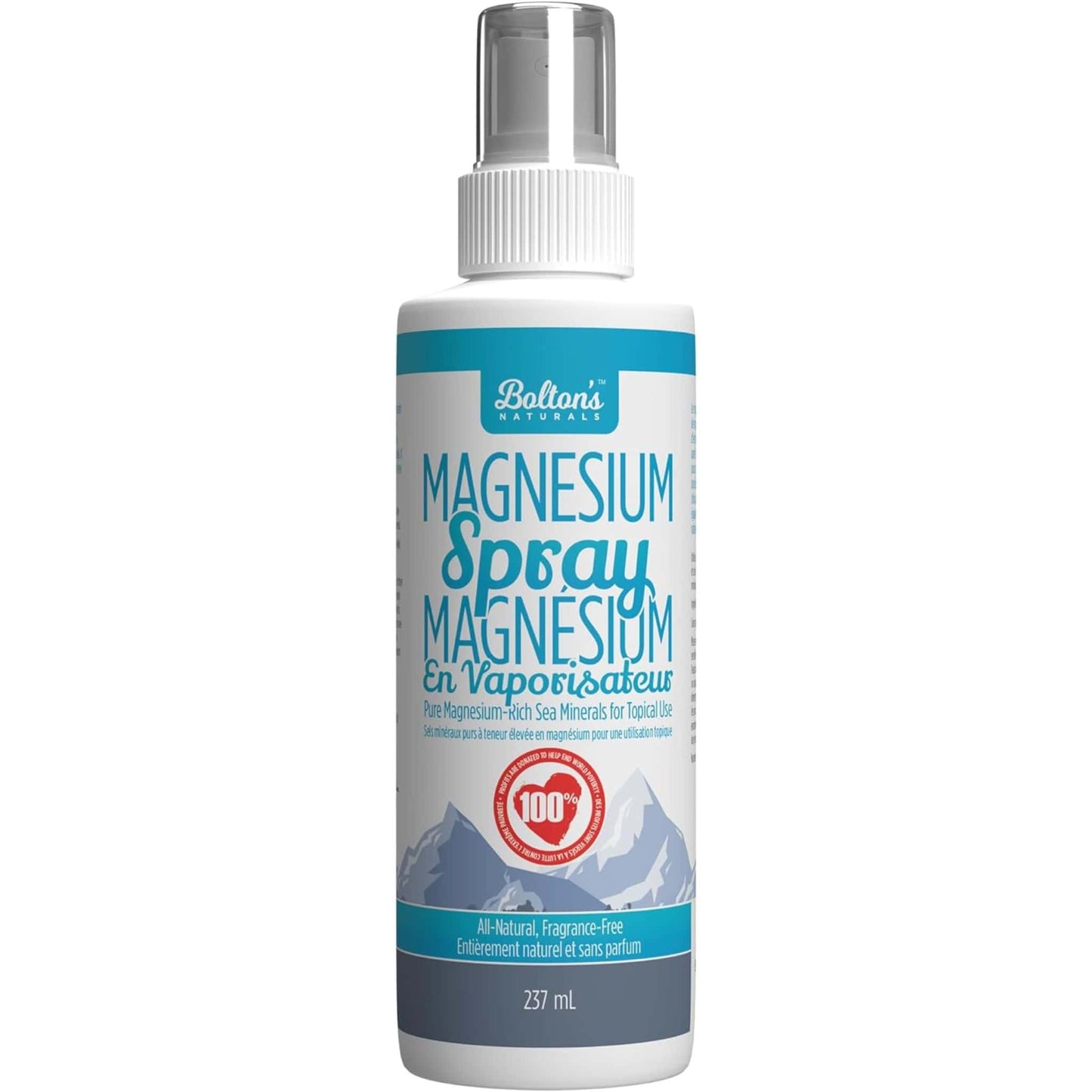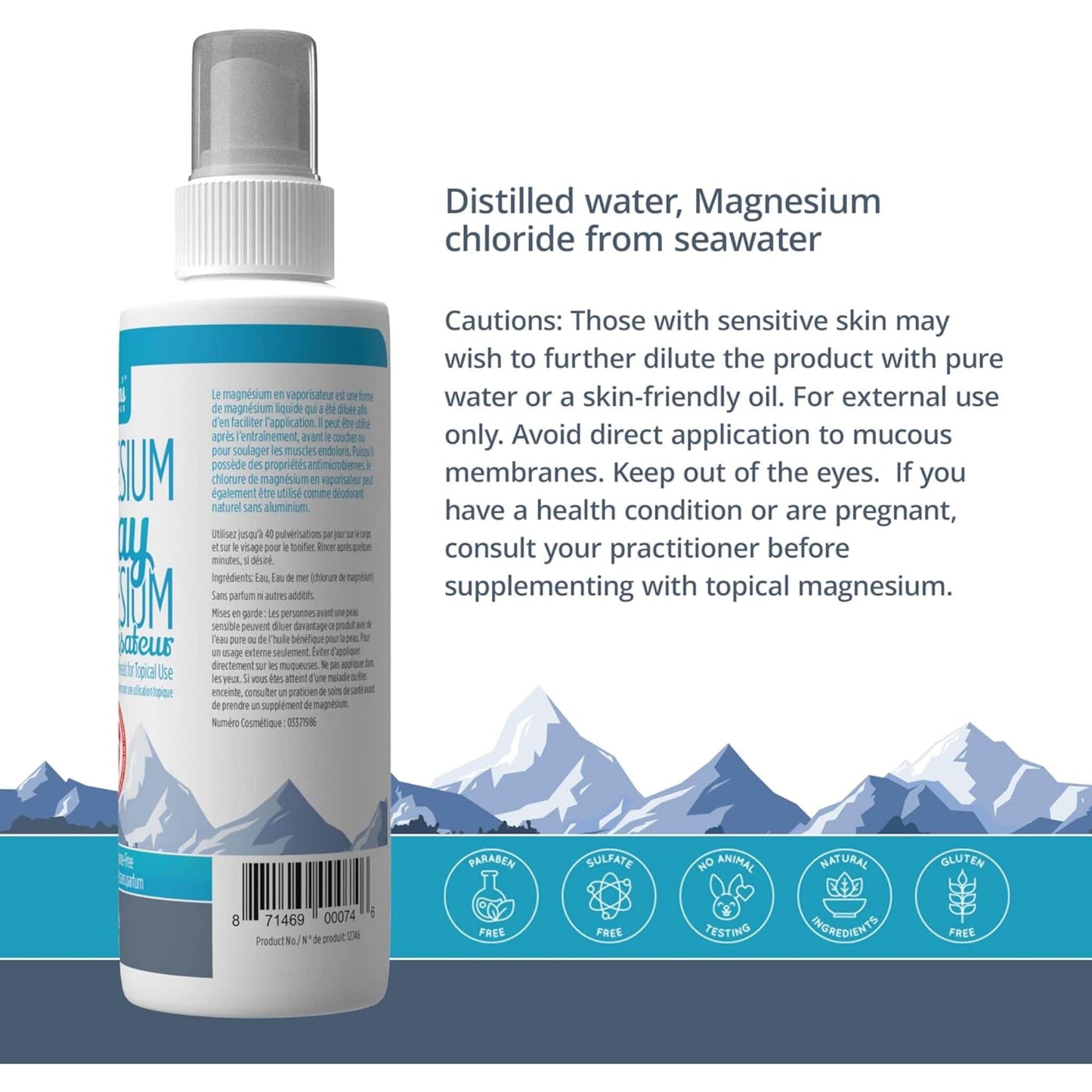Low price guarantee
Vitamart always has low prices and to give you full confidence we have a "Low Price Guarantee".
Find a lower online price at a major Canadian competitor and we will beat the price by 1¢!
To redeem: contact us with proof of the lower price (ie. website link) before or within 10 days of purchase and Vitamart will verify the price and refund you the difference.
Restrictions:
Competitor must ship from and be based in Canada. Vitamart does not offer a guarantee on all competitors, such as marketplaces. Product must be identical and in-stock. Does not apply to clearance, short-dated, out of date promotions, multiple buying discounts ie Buy X for $X, Spend $X get X Free, loyalty/member discount offers, or website typos. Vitamart reserves the right to deny any price claim and to limit quantities for any reason.
Natural Calm Magnesium Chloride Spray (Transdermal)
Natural Calm Magnesium Chloride Spray (Transdermal)
-
Sale Sold outRegular price $11.49 CADSale price $11.49 CAD Regular priceUnit price per
- Notify me when the price drops
Save money with volume discounts!
-
Buy 3+$11.49 $11.26 / eachsave 2%
-
Buy 6+$11.49 $11.15 / eachsave 3%
-
Buy 12+$11.49 $10.92 / eachsave 5%
-
Enjoy secure payments powered by:
- Visa
- Master
- Apple pay
- Paypal
- Google pay
- Shopify pay
- American express
60-day Risk Free Shopping guarantee Learn more







Natural Calm Magnesium Chloride Spray (Transdermal)
:by Natural Calm
If you find a lower price, we'll beat it
Quality products you can depend on
Canadian orders $79+ ship free
Not happy? Return it within 60 days
Natural Calm Magnesium Chloride Spray Details
Magnesium Oil is designed for holding the magnesium onto your skin while the body absorbs the magnesium for relief from aches and pains and other symptoms resulting from magnesium deficiency.[OIL]
Natural Calm Magnesium Oil Highlights:
- Muscle Tension
- Restless Leg
- Nervous System
- Digestion
- Aches & Pains
Suggested Use of Natural Calm Magnesium Oil:
- Apply once daily.
- Reduces skin roughness and inflammation.
- Massage: Rub into sore muscles to relieve the pain.
- Compresses work well for tight, tired muscles.
- Rub the Magnesium Oil into the area.
- Take a small towel and wet it in hot water (as hot as comfortable).
- Place over sore area and allow the heat of the compress to drive the magnesium into the skin. When the compress cools, repeat. Also, apply to legs before bed to relieve restless legs.
Developed by leading nutritional researcher Peter Gillham, Natural Calm features a proprietary process that provides the most absorbable, effective, fast-acting magnesium available anywhere.
Magnesium chloride is the most useful and least toxic form of magnesium. It is a strong, versatile, safe mineral, which boosts all aspects of cell physiology. Topical forms of magnesium are sometimes preferred over the internal forms, because they do not have the same natural laxative effect. It is also the fastest way, after intravenous, to get the appropriate magnesium levels back in the body.
Magnesium and your Health
Did you know that magnesium influences many bodily processes, including digestion, energy production, muscle function, bone formation, creation of new cells, activation of B vitamins and relaxation of muscles, as well as assisting in the functions of the heart, kidneys, adrenals, brain and nervous system? The fact is that lack of sufficient available magnesium in the body can interfere with any or all of these processes. The National Institutes of Health, Office of Dietary Supplements, reports that there is an increased interest in the role of magnesium in preventing and managing disorders such as hypertension, cardiovascular disease and diabetes.
A healthy magnesium level:
Magnesium is an essential mineral. This means that the body doesn't manufacture it and it must be obtained through the diet. Unfortunately, our diets today, with their processed foods, refined sugar and flour, and fruits and vegetables of questionable nutritional value (caused by mineral- deficient soil and chemical farming methods), are commonly quite low in magnesium. The result? A significant percentage of the population have below healthy magnesium levels, including many who already use magnesium. Why is this? First, the amount of magnesium required by the body is greater than people think. Second, many magnesium capsules and tablets do not fully break down and are not completely absorbed by the body.
Symptoms of magnesium depletion:
Millions suffer daily from symptoms that can result from a lack of magne- sium. Because magnesium is required for hundreds of enzymatic reactions (enzymes are protein molecules that stimulate every chemical reaction in the body), deficiency may cause a wide variety of conditions, such as:
- Stress
- Low energy
- Fatigue / weakness
- PMS and hormonal imbalances
- Inability to sleep
- Weakening bones
- Muscle tension
- Muscle spasms & cramps
- Abnormal heart rhythms
- Headaches
- Anxiousness
- Nervousness
- Irritability
- Constipation
What depletes magnesium?
Magnesium deficiency can be caused by a number of things, including— but not limited to—lack of adequate dietary magnesium, emotional stress, some drugs (diuretics, antibiotics, birth control pills, insulin, cortisone), heavy exercise, diabetes, gastrointestinal disorders and excessive calcium in the diet.
Let's look at some of the impacts low levels of magnesium can have on the body.
Calcium and Magnesium
Calcium and magnesium are two dif- ferent sides of a coin. Calcium excites nerves, while magnesium calms them down. Calcium makes muscles con- tract. Magnesium is necessary for muscles to relax. Calcium is needed for blood clotting, but magnesium keeps the blood flowing freely.
It is easy to see that maintaining these minerals in balance is vital and that too little magnesium to balance calcium could be both uncomfort- able and unhealthy.
The Anatomy of Stress
When stress becomes constant in our lives—be it mental, emotional, environmental or physical—the con- tinual state of hypervigilence of our bodies and cells can be detrimental to our health. This is especially true when one is low in magnesium (a condition common to the majority of Americans).
Going through a stressful period without sufficient magnesium can set up a deficit, which if not corrected, can linger, causing more stress and further health problems (see symptoms above).
Without sufficient magnesium, the nerve cells cannot give or receive messages and become excitable and reactive. This causes a person to become stressed, highly sensitive and nervous. Feelings of nervousness, irri- tability and being unable to relax are signs of needing magnesium.
The stress response involves the influx of calcium into cells, resulting in a drastic change in the cells' inter- nal magnesium-to-calcium ratio.
Normal cells contain 10,000 times more magnesium than calcium. If the amount of cellular magnesium falls, however, calcium ions flow into the cell. With such an imbalance, cal- cium puts the cell into a hyperactive state. This can cause muscle contrac- tion and lead to painful cramping. Muscles need magnesium in order to relax.
Low magnesium/high calcium levels can cause cells to physically change. High calcium makes bones stiff and hard, which is good, but in soft tissues it becomes a problem of calcification. This stiffness in artery and heart cells can hamper their proper function.
Excess calcium is a very widespread problem. Too much calcium depletes magnesium in the body and, as a result, can bring about the symptoms of magnesium depletion mentioned on page one.
Noted author and researcher Mildred S. Seelig, MD, explains: "Calcium is an important essential nutrient, but it must be guarded and controlled and balanced by adequate magnesium if it is not to cause damage to the cells and the body as a whole."
While excess calcium can become a problem, excess magnesium is not a concern. Unlike calcium, magnesium does not build up in the body—excess amounts are simply eliminated.
Heart Connection
The heart and blood vessels need magnesium to stay healthy. Yet this vitally important nutrient is depleted from our soils and is inadequate in many of our processed foods and water supplies, just when our stress- ful lifestyles demand that we have more. The effects of a low intake of magnesium can be worsened by the high levels of fat, sugar, sodium (salt) and phosphate in our diets as well as, ironically, by the over- use of calcium supplements, which has become widespread because of our awareness of calcium's value for bone health.
Fatigue and Energy
Magnesium plays a key role in the energy process within each indi- vidual cell and in our overall energy levels. When insufficient magne- sium is available, energy produc- tion is inhibited and the eventual outcome is fatigue and weakness. Magnesium is vital for the storage and transport of energy within our bodies. Magnesium is also essential for regulating potassium levels and for the functioning of the adrenal glands; both are important for main- taining high energy.
Nutritional magnesium is deeply involved in energy production, oxygen uptake, function of the central nervous system, electrolyte balance, glucose metabolism and muscle activity, including that all-important muscle— the heart.
Many studies have shown that mag- nesium supplementation enhances the performance and endurance of long-distance runners, cross-country skiers, cyclists and swimmers. In fact, a number of medal-winning American track-and-field athletes at the recent Summer Olympics have used mag- nesium to boost their performance, prevent muscle cramping and speed recovery.
The Solution
The best way to take magnesium is in a form that can be completely dissolved in water. In this state it will absorb quickly into the body, producing fast relief. Pills need to break down into liquid form before they can be absorbed and not all people, especially as they grow older, have the capacity to digest these. The result may be the absorption of little, if any, actual nutrition. Natural Calm was developed especially for superior absorption. Natural Calm is an ionic (molecular charge that allows the element to readily bond with water) magnesium powder that provides a highly absorbable, effec- tive, fast-acting form of magnesium.
The proprietary process that resulted in Natural Calm was developed by nutritional researcher Peter Gillham and has made Natural Calm the best- selling magnesium supplement in the natural food industry.
Natural Calm can be taken safely on its own without side effects. It per- mits variable dosage, so you can take more or less magnesium as your body requires (see label for directions).
Natural Calm will help your body to perform its normal functions and overcome symptoms associated with low magnesium levels—all as a result of magnesium being available to do its vital job.
Millions have experienced the stress relief, health, calm energy and peace of mind that Natural Calm provides. You can too! Available in bottles and convenient single-serving packs in original and organic flavors with organic stevia.
Magnesium Oil may need to be diluted half strength with water as some people may experience skin irritation.
Nutrition Facts / Valeur nutritive
|
|
||
| INGREDIENTS: | ||
|
|
||
|
|
||
|
Ingredients: Each 1 ml contains Magnesium Chloride (Sea Water) [Magnesium 60mg] .......235 mg Non-Medicinal Ingredients: Distilled Water |
Warning: Do not use if pregnant or breastfeeding. For external use only. If symptoms persist or worsen consult a health care practitioner.







